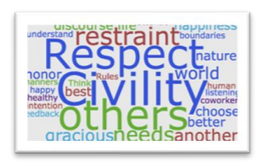| Will Rogers once said, “The history of America can be written in three phases: the passing of the Indian, the passing of the buffalo, and the passing of the buck.” If Rogers was still alive, I wonder if he might not add “the passing of civility.” The first definition of civility in a dictionary is “politeness,” but I believe it is more than that, even more than merely having good manners. Civility is the ability to face opposition with grace and self-restraint. and is rooted in an understanding of, and respect for, the inherent dignity of every individual. |
Every person is made in the image of God (Gen. 1:27) and is someone for whom Jesus died (Heb. 2:9). No wonder James wrote about the apparent contradiction in how some use their tongue, “With it we bless our God and Father, and with it we curse men, who have been made in the similitude of God” (Jas. 3:8).
We don’t have to look very far to find examples of people not being civil toward one another. Perhaps it is road rage with red faces and threats, dangerous maneuvers, and obscene gestures. Perhaps it is a post on Facebook containing offensive, demeaning language, and racial slurs. Perhaps it is a political debate where the “my worthy opponent” sentiment is forgotten, where no respect is shown, and where insulting verbiage is freely employed by both sides. Perhaps it is someone rejoicing at the misfortune or illness of another.
Need I go on?
The word “civility” is not found in the Bible, but the idea certainly is. Consider these passages.
“A soft answer turns away wrath, but a harsh word stirs up anger” (Prov. 15:1). “Therefore, whatever you want men to do to you, do also to them, for this is the Law and the Prophets” (Matt. 7:12). “Do not be overcome by evil but overcome evil with good” (Rom. 12:21). “But now you yourselves are to put off all these: anger, wrath, malice, blasphemy, filthy language out of your mouth” (Col. 3:8).
am not suggesting at all that we compromise the truth, that we avoid unpleasant topics, that we become passive about matters that concern us, or that we should not voice our concerns. I am suggesting, however, that we maintain civility. It’s as simple as that.
It’s as difficult as that.
We don’t have to look very far to find examples of people not being civil toward one another. Perhaps it is road rage with red faces and threats, dangerous maneuvers, and obscene gestures. Perhaps it is a post on Facebook containing offensive, demeaning language, and racial slurs. Perhaps it is a political debate where the “my worthy opponent” sentiment is forgotten, where no respect is shown, and where insulting verbiage is freely employed by both sides. Perhaps it is someone rejoicing at the misfortune or illness of another.
Need I go on?
The word “civility” is not found in the Bible, but the idea certainly is. Consider these passages.
“A soft answer turns away wrath, but a harsh word stirs up anger” (Prov. 15:1). “Therefore, whatever you want men to do to you, do also to them, for this is the Law and the Prophets” (Matt. 7:12). “Do not be overcome by evil but overcome evil with good” (Rom. 12:21). “But now you yourselves are to put off all these: anger, wrath, malice, blasphemy, filthy language out of your mouth” (Col. 3:8).
am not suggesting at all that we compromise the truth, that we avoid unpleasant topics, that we become passive about matters that concern us, or that we should not voice our concerns. I am suggesting, however, that we maintain civility. It’s as simple as that.
It’s as difficult as that.

 RSS Feed
RSS Feed